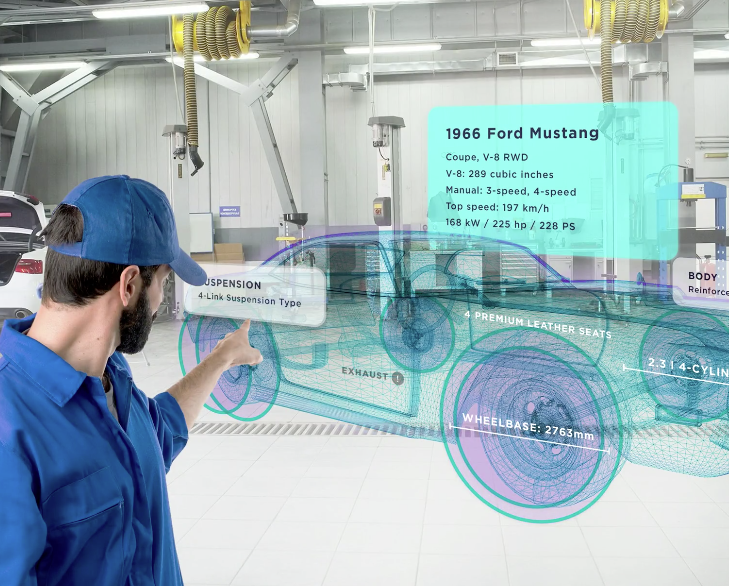 EMERGING TECH
EMERGING TECH
 EMERGING TECH
EMERGING TECH
 EMERGING TECH
EMERGING TECH
Los Angeles-based company Verses, maker of a protocol for virtual and augmented reality that allows people to own, monetize and trade digital goods set in physical spaces, announced the startup’s launch of its service today.
Verses has also partnered with Blockchain Industries, Inc., Decentra Fund and other parties to launch a private token sale internationally, which has already brought in more than $6 million.
With the Verses protocol, developers and users can share VR and AR experiences and objects across all types of devices as well as trade virtual objects between physical locations. That means that a company or individual can place AR objects in the world, visible to people using AR glasses such as HoloLens or Magic Leap One, and allow them to interact with those objects based on where they’re standing.
To do that, Verses overlays distributed ledger blockchain technology over real and virtual world locations and objects, allowing each to receive its own unique identifier. That creates what the company calls “smart spaces” and “spatial domains” – a proposal that real places can possess a virtual layer and enable programmable rules that apply to that space in virtual reality.
“Verses is the sandbox for the next generation of entrepreneurs that want to solve global issues, create new worlds and digital solutions to real-world problems,” said Verses adviser Jay Samit, independent vice chairman at Deloitte Digital.
Blockchain technology provides a tamperproof distributed database that uses peer-to-peer technology to secure an ongoing history of transactions. The process is automated and provides a layer of management that makes the technology attractive to startups and enterprise interests looking to track virtual assets, such as real estate, gift cards, stocks and other virtual items.
The Verses protocol adds a spatial or location-based element to these tracked digital assets. Providing them a virtually “physical” presence in the real world that can be accessed via augmented reality even as they’re available in a virtual world and thus potentially accessible anywhere.
“By overlaying the blockchain on the physical world, you can go to a location and store digital objects there that are known to you as being official, real and allowed to be there,” Samit said. “This new protocol creates order out of what otherwise would have been chaos.”
The blockchain within Verses is used to provide what the company calls “smart assets” that can be transferred between smart spaces. With the backing of a blockchain, these transfers can be tracked through time and space, maintain details of ownership and manage transactions in an automated and secure manner.
It’s all part of what Verses Executive Director Gabriel Rene calls “the Spatial Web,” a moniker taken from the emergence of the world wide web, which he describes as a formation within Web 3.0, following web pages and social media.
To do that, Verses developed what is called “spatial contracts,” which are smart contracts that interact and trigger based on where virtual objects are deployed in the real world, changing how they can be interacted with.
“The next generation of augmented and virtual reality can now include authenticated location data, real-time mapping and physical asset tracking between specific locations,” said Rene. “This technology powers a new era of fully interconnected and immersive interactive experiences that speak to consumers’ moods and thoughts.”
Spaces could limit what kind of virtual objects would be allowed there. For example, objects placed using Verses that could be accessible at a school would be different from those that would be placed in a car dealership or a college campus.
By donning AR glasses, or using a smartphone, a user would then be able to interact with the Verses world and find objects placed in specific locations, user particular rules, and have good reason to believe they’re authentic or “official” based on their locale. As a result, advertisers and marketers could take up specific spots in a space and put together official displays, provide models or virtual toys related to a location without interlopers intruding or placing counterfeit items there.
Linking the virtual and the physical the other direction is also possible with Verses. Physical objects, such as shipping crates in a warehouse or cars on a showroom floor could be marked as augmented objects in Verses, with their location and disposition included in the blockchain. Those objects would then have virtual interactable components visible with AR glasses that could display vital stats, such as what’s in the box, where it’s going or whom it belongs to, depending on information accessible to the wearer and the location of the object.
By providing a framework for having virtual objects in an augmented reality understand location and spatial attributes, Rene believes that this would make those spaces valuable and therefore useful within the Verses protocol.
The company is launching its product at the Blockchain Futurist Conference today where the protocol and its implications of the technology will be demonstrated.
To continue to power its platform, Verses is also planning a public international crowdsale of its Verses VSS token. These tokens will be used to power the spatial web by providing a trading currency for building assets, spatial contracts and smart spaces.
[Ed note: A previous version of this article wrote that Verses had raised $6 million from its partners, that has been corrected to say that the money had been raised through a private token sale.]
Support our mission to keep content open and free by engaging with theCUBE community. Join theCUBE’s Alumni Trust Network, where technology leaders connect, share intelligence and create opportunities.
Founded by tech visionaries John Furrier and Dave Vellante, SiliconANGLE Media has built a dynamic ecosystem of industry-leading digital media brands that reach 15+ million elite tech professionals. Our new proprietary theCUBE AI Video Cloud is breaking ground in audience interaction, leveraging theCUBEai.com neural network to help technology companies make data-driven decisions and stay at the forefront of industry conversations.